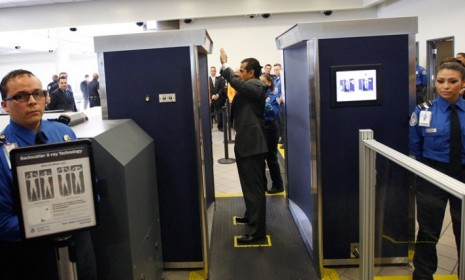The airport security scanner that knows what you ate for breakfast
The Department of Homeland Security is reportedly developing a new scanner that can detect everything from traces of gun powder to adrenaline levels

A free daily email with the biggest news stories of the day – and the best features from TheWeek.com
You are now subscribed
Your newsletter sign-up was successful
"If the TSA's full body scanners make you nervous," says Marc Georges at Mashable, "the Department of Homeland Security's new molecular scanner may have you locking yourself at home and ordering in for the rest of your life." The government has teamed up with a subcontractor to produce a new laser scanner that can detect "traces of drugs or gun powder on your clothes," says Gizmodo, as well as the egg sandwich you had for breakfast and the adrenaline level in your body — all "without you knowing it." The new scanner is reportedly slated for use in airports and border crossings, but could have other applications as well. Here, a guide to this high-powered addition to the government's security arsenal:
How does it work?
The new scanner "fires a laser to provide molecular-level feedback" from your body, says Gizmodo. The results show up almost instantly on an attached computer screen, which can identify the most granular details, "even certain chemical changes in plant life," says Georges. The laser has a range of 164 feet, which means passengers could be scanned without even knowing it — "say while waiting to check in" to a flight, says John Roach at MSNBC.com.
The Week
Escape your echo chamber. Get the facts behind the news, plus analysis from multiple perspectives.

Sign up for The Week's Free Newsletters
From our morning news briefing to a weekly Good News Newsletter, get the best of The Week delivered directly to your inbox.
From our morning news briefing to a weekly Good News Newsletter, get the best of The Week delivered directly to your inbox.
Are there other machines like it?
Yes. Russian scientists have reportedly created a laser than can isolate a single molecule in a million from 50 meters away. However, what makes the new scanner "so special is that the machine is more compact compared to the other devices and can still maintain its incredible range," says CBS DC. That means authorities can use the machine virtually anywhere.
Who makes it?
A company called Genia Photonics makes the scanner, technically known as a Picosecond Programmable Laser, which is slated to debut within the next year or two, according to Gizmodo. Genia's laser work was subcontracted by In-Q-Tel — a company founded in 1999 at the urging of the Director of the CIA and with the endorsement of Congress — to work with Homeland Security.
A free daily email with the biggest news stories of the day – and the best features from TheWeek.com
Are there privacy concerns?
Yes. For example, if you happen to have gone shooting at a gun range before arriving at the airport, "the trace amounts of gunpowder left on your clothing might earn you a date with 'Mr. Happy Hands'" of the TSA, says Jason Mick at Daily Tech. Furthermore, since the machine is so portable, the technology could easily "extend beyond the airport or border crossings and into police cars," says Gizmodo, which could allow police officers to search you for suspicious substances while you walk down the street.
Sources: CBS DC, Daily Tech, Gizmodo, Government Technology, Mashable, MSNBC.com
-
 Democrats push for ICE accountability
Democrats push for ICE accountabilityFeature U.S. citizens shot and violently detained by immigration agents testify at Capitol Hill hearing
-
 The price of sporting glory
The price of sporting gloryFeature The Milan-Cortina Winter Olympics kicked off this week. Will Italy regret playing host?
-
 Fulton County: A dress rehearsal for election theft?
Fulton County: A dress rehearsal for election theft?Feature Director of National Intelligence Tulsi Gabbard is Trump's de facto ‘voter fraud’ czar